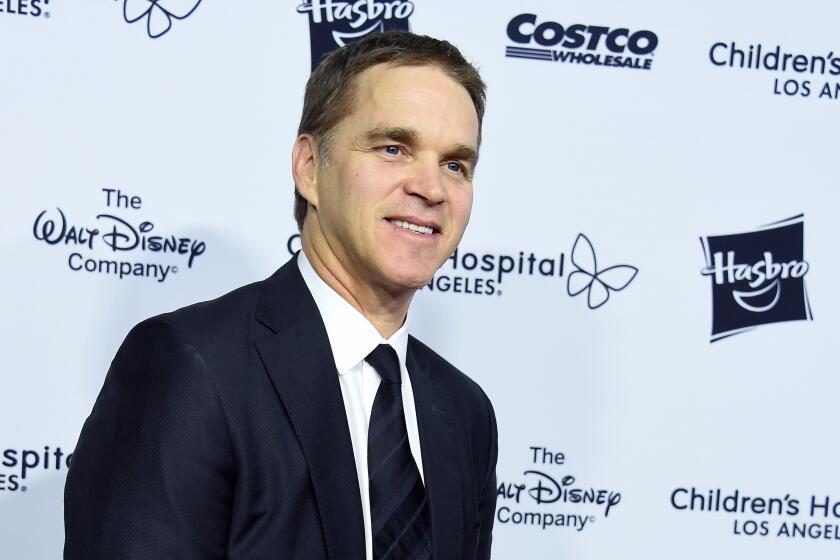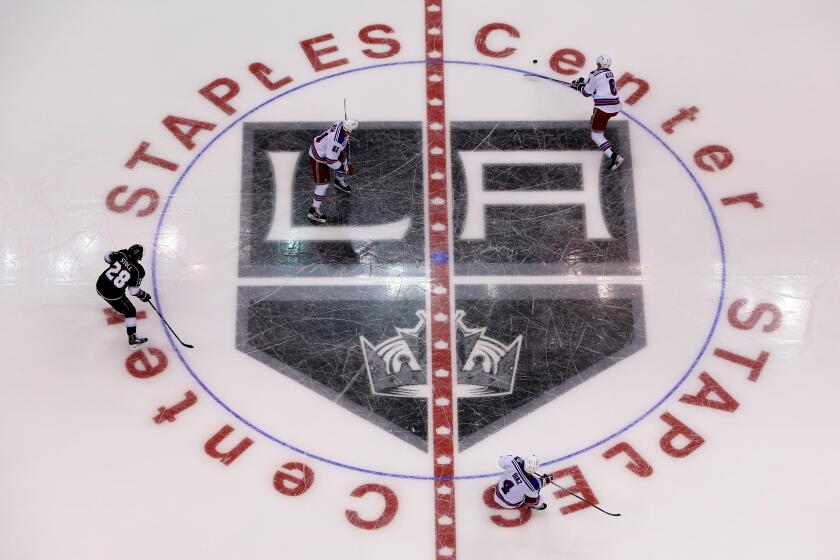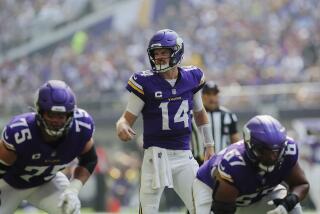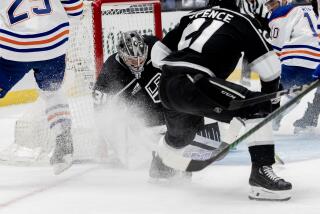Kings prospect Jaret Anderson-Dolan’s pro journey has been paved by his two moms
When Rob McCann and his newlywed wife began billeting junior hockey players from the Spokane Chiefs in 2004, they stuck to one simple rule.
“We’ll do it ‘till we get a bad kid,” McCann says.
Sixteen years later, they are still welcoming players into their spare basement bedroom every year, providing a home to teenagers who moved far away from their own to pursue hockey dreams. But just because they haven’t had a bad kid doesn’t mean they haven’t seen any bad behavior. After all, “they’re teenage boys,” McCann says. “They’re going to try and sneak girls and beer in through the window like any other teenager. So you’ve got to have some rules.”
The exception: Jaret Anderson-Dolan.
Years before he became one of the Kings’ most anticipated prospects in recent memory, Anderson-Dolan first walked through the McCanns’ front door as a 16-year-old entering his second Western Hockey League season with the Chiefs. Even then he was unlike any of the players the McCanns had hosted in the past.
He ate well, avoiding food that wasn’t organic or milk that wasn’t soy. He slept right, in bed by 8 most nights and up at 6 a.m. to start his day with yoga. Most of all, he never acted immature. There was no sneaking out. No cutting loose. Only an unwavering focus on school, hockey and his big plans for the future.
Kings President Luc Robitaille says the team wants to finish the regular season, but he thinks the NHL is leaning toward immediately starting the playoffs.
“To this day, I have never seen one like Jaret in terms of off-ice dedication,” McCann says. “We didn’t need any rules. There was no way he was ever going to do anything that would remotely danger his hockey career.”
It made McCann, a father himself, wonder. Who were the people who raised this respectful, responsible, relentless young man? How did they instill such strong traits at such a young age? Just who were Jaret Anderson-Dolan’s parents? And how did they get the hardest job in the world so right?
::
From a back-corner booth inside a suburban diner in Calgary, Canada, Fran and Nancy Anderson-Dolan can’t help but chuckle at their memories of motherhood, the years spent turning their two sons into men.
Fran, a former semi-pro hockey player with short white hair spiked up in the front, cracks up between sips of coffee, loud and loving laughter that cuts through the clattering of breakfast plates and chatter of nearby patrons.
Picking away at a side of gluten-free toast beside her, the soft-spoken Nancy reminisces too, a gentle smile on her face and a long blonde ponytail flowing out the back of her black ball cap.
Her wife’s words rising only slightly above a whisper, Fran leans over to Nancy mid-sentence.
“You can talk a little louder, sweetie,” she says. “It’s loud in here.”
Fran and Nancy have lots of moments like this — total opposites who create perfect harmony, inverse identities who make a perfect match as parents.
As Jaret puts it, “They’ve got their own personalities. They’re a little bit different. But it’s a good balance.”
Fran and Nancy met as teenagers at a hockey tournament in the small town of Coleman, Canada, their paths first crossing in a crowded church basement where their teams were staying. Natives of Calgary, they kept in touch after returning home, dated on and off through high school, and got together for good in the winter of 1987.
“It’s a bad typical lesbian story” Nancy says, jokingly. Only in their version, hockey was at the heart of everything that followed.
Fran carved out a career in high-level women’s leagues around Alberta, giving up the game only once their sons started to pick it up themselves. Their oldest, Dorian, who is Nancy’s biological son, played until he turned 12, a former goalie who decided to pursue mountain biking and skiing instead. Jaret joined in as soon as he was old enough to skate, quickly learning to fly around the family’s makeshift backyard rink as if he was running on dry land.
Before long, Fran says, “He was obsessed.”
So, his moms tried to give him every opportunity to succeed.
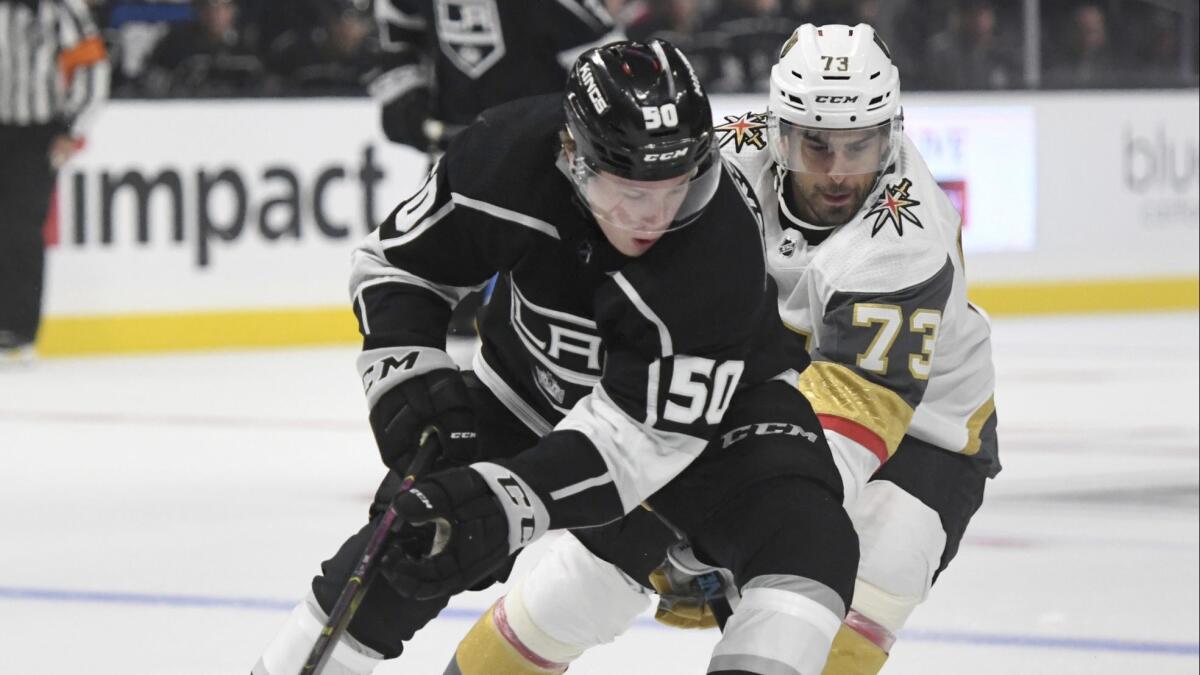
Fran, who is Jaret’s biological mom, coached some of Jaret’s youth teams herself. But as he grew, she kept pushing him behind-the-scenes, taking him to camps across the continent and, when he turned 12, enrolling him at a Calgary prep academy for athletes, the Edge School.
“She’s the one that got me into it to start with,” says Jaret, 20. “As I got older, she became more of a supporter, but I think more than anything, it was just kind of her staying on me to be disciplined. She was always supporting me to do that, pushing me to do that.”
Nancy was more of the cheerleader, the calming voice of encouragement in the back of Jaret’s mind. As a professional nutritionist, she helped Jaret nurture his notorious life habits. As a mom, she nourished his lofty dreams of landing in the NHL.
“Hockey and sports aside, they’re really good people,” says Scott Fukami, one of Jaret’s coaches at the Edge School. “And when I talk about Jaret, as good of an athlete as he is or as good of a hockey player as he is, he’s a great person. You see those traits that obviously he was raised with, growing up in a great environment. Those things translate athletically.”
When the coronavirus outbreak hit, hockey equipment manufacturer Bauer switched to making medical-grade face shields. It’s a great example of human ingenuity.
Always somewhat undersized, Jaret wasn’t always an obvious future pro. For a long time, his ambitions outpaced his abilities. But when Fukami started working with him, the coach noticed something. Even as a kid, Jaret was a perfectionist with a purpose, a young player with a carefully crafted plan.
“Lots of people say, ‘I want to be this,’ they just don’t know the end goal, they don’t know how to achieve it,” Fukami says. But in Jaret’s case, “He broke it down, whether it was his off-ice training, his on-ice training, improving his skating or all his skills. He had a process.”
For that, Jaret gives his moms all the credit.
“How hard they work, how well they treat people … that’s the big thing,” Jaret says. “I watched them do that my whole life. It opens your eyes [when you’re] young and makes you want to be like them.”
::
These are all the things Anderson-Dolan loves to share about his moms.
The type of people they are. The indelible impacts they left on his growth. The infinite reasons he loves them so much.
It’s the part of his parentage that isn’t asked about enough. In the past, he’s found that, in the public eye anyway, there is less interest in who his moms are and more on what they — and he himself — represent.
Yes, he is a professional athlete raised by two women. Yes, it makes his backstory rather uncommon. Yes, it has put him in a position to champion LGBTQ causes, standing proudly by his moms’ side.
But no, he doesn’t see it as a big deal. Never has been.
“To this day, I don’t really think anything of it,” Anderson-Dolan says, “other than it’s become a little bit more of a story now.”
His upbringing — which also included several openly gay aunts and uncles — wasn’t widely known until his draft year in 2017, when he casually mentioned his moms to a reporter from the local paper in Spokane, Wash. Stories quickly snowballed from there, feeling at times like an avalanche of attention surrounding the run-up to his selection by the Kings in the second round that summer.
“People may say, obviously, it’s a little bit different, but for me it’s completely normal,” he said the night of the draft. “For me, it kind of gives you a little bit of perspective just how much the world is changing, and I think it’s come a long way in the past couple of years. It’s really cool to be in this situation and have a voice in the community that way.”
At the same time, he was always somewhat surprised by the spotlight he was under. He embraced the opportunity “to normalize situations,” to make an impact. Yet, part of him wondered why it was even a story at all.
“Having two moms — I don’t know what you want to call it, but people think for some reason that’s an odd thing and it makes you maybe not be as good of a hockey player, whether you’re gay yourself or if you have two moms or two dads,” he says. “That’s just not true. And that’s the big thing, just wanting to get that message out that it feels normal for me. It’s not an impact on how I play. I don’t think about it at all. It’s just part of my life and I’m happy. I wouldn’t want to change anything.”
Anderson-Dolan might not have ever worried about it, but his moms sometimes did. While he was playing in Spokane, Fran found bigoted comments on an online discussion board. During a Chiefs trip through Alberta, Fran and Nancy ignored jeers from the crowd while Jaret blocked out verbal abuse on the ice.
The good, however, always far outweighed the bad. In Spokane, the only time Anderson-Dolan’s moms became a focal point was on the team’s “Hockey is for Everyone” night, when all his teammates used rainbow tape on their sticks during warm-ups.
As the Kings prepared to draft him, director of amateur scouting Mark Yannetti said at the time, the only consideration made with regards to his two moms was their reputation as “A-plus” parents.
After playing in nine NHL games during the past two seasons, Anderson-Dolan is expected to battle for a full-time roster spot when the Kings resume play. And he’s ready to navigate inquiries about his upbringing, knows how to steer each familiar conversation back to what he loves most about his moms, back to the things that make them truly important.
With the coronavirus outbreak threatening to prevent the NHL season from restarting, the Kings are offering refunds to season-ticket holders.
“He got really good at talking about it in a way that made other people comfortable,”says McCann, who remained friends with Fran and Nancy even after Jaret moved out of his house. “Most people, when they talk to you about it, they’re deathly afraid they’re going to say the wrong thing or offend you. Jaret always put people at ease.”
Consider it one more lesson passed on through parenting, a perspective of tolerance and understanding that stretches far beyond the ice.
“I’m not going to tell you how to view the world,” Anderson-Dolan says. “I don’t have the right to do that. That’s not who I am. But, it’s just getting it out there that it’s normal. Everybody thinks it’s a big deal, but it’s not. I grew up, I had a great childhood. Great brother. Two loving moms. That’s more than a lot of people get to say. So I’m very lucky.”
More to Read
Go beyond the scoreboard
Get the latest on L.A.'s teams in the daily Sports Report newsletter.
You may occasionally receive promotional content from the Los Angeles Times.

